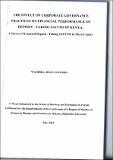The Effect of Corporate Governance Practices on Financial Perfomance of Deposit-Taking Saccos in Kenya

View/
Date
2015-07Author
Wachira, Diana Wanjiku
Type
ThesisLanguage
enMetadata
Show full item recordAbstract
Savings and Credit Cooperative Societies (SACCOS) have been growing as a strong tool to meet financial needs. This is because, cooperatives are well placed to bring about equitable development and justice. However, SACCOS like any other business, are faced with challenges in their quest for growth and corporate governance stand as one of the main challenges facing SACCOS. Corporate governance is a concept that involves practices that entail the organization of management and control of companies. It reflects the interaction among those persons and groups, which provide resources to the company and contribute to its performance such as shareholders, employees, creditors, long-term suppliers and subcontractors. Corporate governance has received much attention in the accounting literature, with studies focusing on the impact of corporate governance and the financial performance of the firm. Few of these studies have focused on the relationship between corporate governance and financial performance of the deposit taking Savings and Credit Cooperatives in Kenya. The purpose of the study was to explore the relationship between corporate governance and the financial performance of the deposit taking Savings and Credit Cooperatives in Kenya, a survey of SACCOS in Meru County. In particular, the specific objectives were to study how CEO/Chairman duality, board composition and disclosure affect financial performance. The study adopted the use of a descriptive research design. This was done by doing a census study of the 11 deposit taking SACCOS in Meru County. From a target population of 454 employees, the study sampled 44 respondents for purposes of the study. Data collection involved the use of questionnaires for primary data and study of SACCOS' financial statements for secondary data. Data collected was analyzed by descriptive statistics and inferential statistics. Hypotheses were tested using P-value at 0.05% level of significance. Multiple linear regression was used to link the relationship between independent variables and dependent variable. Descriptive data was presented in the form of frequency tables and percentages. The data was analyzed using SPSS. Tables were used to summarize responses for further analysis and facilitate comparison. The findings of the study revealed that CEO/duality and disclosure had a significant effect on financial performance, while board composition did not have a significant effect on financial performance. The study therefore recommends the following; that clear separation and definition of functions between the CEO and chairman of the board be upheld, the board to comprise of well-educated people since they are actively involved in shaping SACCO strategy, and SACCOS should always uphold the standards and allowable levels and practices of disclosure within their ranks.
Publisher
KeMU
Subject
Financial perfomance of deposit-taking saccoscorporate governance practices on financial perfomance
Description
HD 2741 .W36 2015
